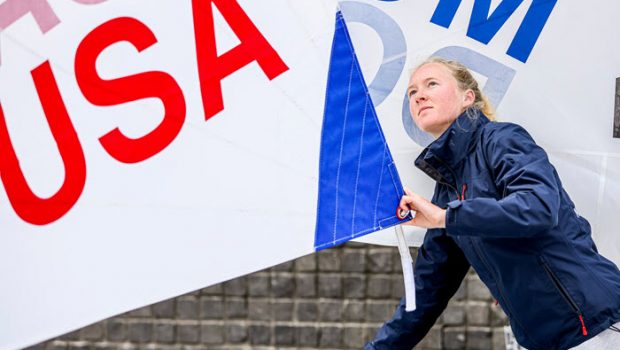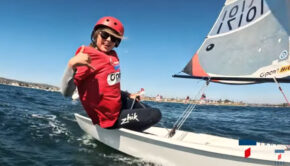Paul Cayard: Rising the tide
Published on July 12th, 2022
Scuttlebutt editor Craig Leweck recently met with Paul Cayard who was appointed in May 2021 to revitalize the U.S. Olympic Sailing program. Following Part 1 and Part 2 of the interview, here’s the final section:
A lot has been said about how the US Olympic Sailing program does not have government support.
There’s something like 170 countries that go to the Olympic Games, and the USA is among maybe three or four that don’t have governmental support. All the European countries have it. Even Argentina and Brazil have governmental support. We have zero, though to be fair, what we do have is the US government allows people to contribute to the Olympic teams and get a tax deduction. So you could say that’s governmental support, and I don’t know if other countries offer that value.
But in the United States of America, we do understand something that most countries don’t, which is called an endowment. We know this really well, as all our universities are endowed. So we just need to get smart and get serious and build endowments for the US Olympic team, which is all sports. They have one, but they should work on that harder. And in sailing, we should do the same.
But despite this lack of government support, the USA does do quite well in other Olympic sports. What is it about sailing?
Sailing is an equipment intensive sport which is a significant cost. If you’re a runner, you show up to a track with your shoes and you’re good to go. Also, there are certain sports where college develops them directly, such as swimming, athletics, basketball, etc. It helps that the Olympic competition is exactly like the collegiate level, but sailing is not one. This is an issue, and it is why we need to get college to be a machine for us and produce great sailors in the Olympics.
Now, U.S. Ski & Snowboard were where we are now 25 years ago, and they got together a group with Tom Weisel and Peter Kellogg. They now have an endowment, and they have a group of trustees who pitch in.
They have a $30-million-a-year budget, 10 million of which is corporate because they have World Cup events and get TV rights, revenue, and sponsorships. They get another third from private donations with the balance from the United States Olympic & Paralympic Committee (USOPC) … they’re the biggest recipient of money because they’re very successful.
As I’m on the receiving end of fundraising letters from USOPC, I know they’re fundraising just like everybody else.
They are, and like I said, they have an endowment and are trying to raise money for all the sports.
Whereas many top Sailing nations have a subjective process, the USA is required to have an objective system where the winner is selected. This process had previously been held in the USA but has since gone offshore.
Correct, the selection events left because the number of competitors dwindle, and they didn’t want to hold trials with just a handful of competitors. Also, there was concerns about people dedicating too much time at the trials venue to get really good at just sailing in that condition, like, let’s say Biscayne Bay which is a pretty unique condition. We had some people win the trials and went on to the Olympics and didn’t do so well.
So those were the reasons they shifted to use two international competitions and combine the scores for selection, but I see problems with that plan which have snowballed.
For starters, few people are going to go to those selection competitions. It’s expensive, so only the top couple teams go, which abandons the effort to grow strength in the USA. You’re just giving up on it.
For the trials regatta we had before Los Angeles 1984, we had 25 or 30 boats in every single event. So you’re giving up on that. Back then, anybody could go and win the US trials. You could go to the Olympics having never won anything. I contend it’s good to go to the Olympics knowing that you beat everybody in your country.
And then there’s the motivational factor. You have all these great Olympians in the parking lot, and then you have the kids from the junior program walking around and seeing them and saying, “Yeah, I want to do that. I want to train that hard. I want to do it.”
It has led to where we are now with the hard task of rebuilding the strength in the program, and bringing the trials back to the USA is an integral piece of the puzzle.
Will all ten events have their selection in the USA?
No, we are in a transitional period for Paris. I’m the one beating my fist on the table, but through thorough consideration by the selection committee, I agree with their assessment that we’re not ready to host the domestic trials in all 10 events. Some of them are too thin. So we have to accept that, and we have to let those classes mature. But this will still be a significant step to repatriate the trials, and we’ll make it a point that for Los Angeles 2028, we will have selection for all ten events at the regatta venue in Long Beach, CA.
Editor’s note: The USA has just released its selection procedures. For details, click here.
So you are working to build a better program, but you still need people in the boats.
Agreed, we have to cast the net farther than before. We have to do our homework. We have to go around to the regional clinics. We have to work with colleges. We have to leverage assets like Siebel Sailors Program … who knows… we might find some inner-city kids in St. Louis who really like the iQFOiL and they’re really good at it. The country has 330 million people with loads of great athletes that have never had exposure to sailing.
You say we need people in boats. You’re right, and we need to go get them. That’s another job. I tell you, there’s so many jobs. I need a training base in Long Beach. I need to raise more money. I need to get better coaches. I tell you, this is the hardest job I ever had. It’s way harder than the America’s Cup. But we are going to get there.









 We’ll keep your information safe.
We’ll keep your information safe.